一、步骤
1.创建工程
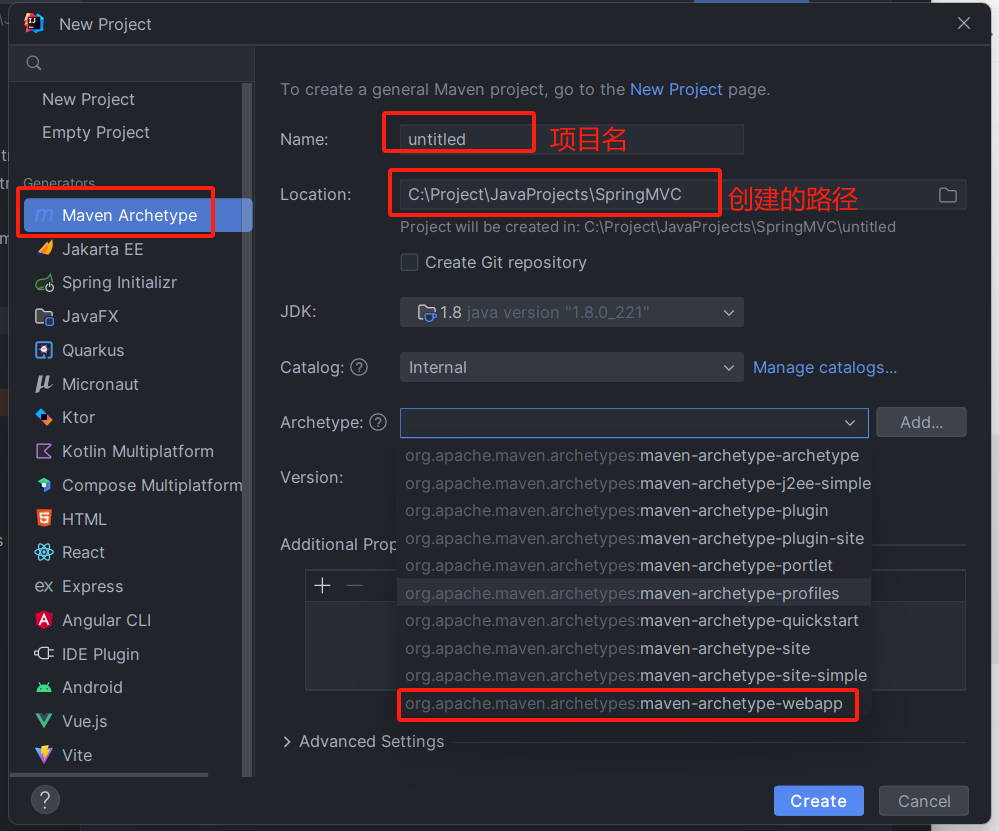
2.加入springmvc依赖--pom.xml
<!--springmvc依赖-->
<dependency>
<groupId>org.springframework</groupId>
<artifactId>spring-webmvc</artifactId>
<version>5.2.10.RELEASE</version>
</dependency>
<!--lombok依赖-->
<dependency>
<groupId>org.projectlombok</groupId>
<artifactId>lombok</artifactId>
<version>1.18.24</version>
</dependency>
<!--servlet依赖-->
<dependency>
<groupId>javax.servlet</groupId>
<artifactId>servlet-api</artifactId>
<version>2.5</version>
</dependency>
<!--jackson依赖:字符串转换-->
<dependency>
<groupId>com.fasterxml.jackson.core</groupId>
<artifactId>jackson-databind</artifactId>
<version>2.15.2</version>
</dependency>
3.创建springmvc的配置文件
如果没有证明没有引入springmvc的依赖
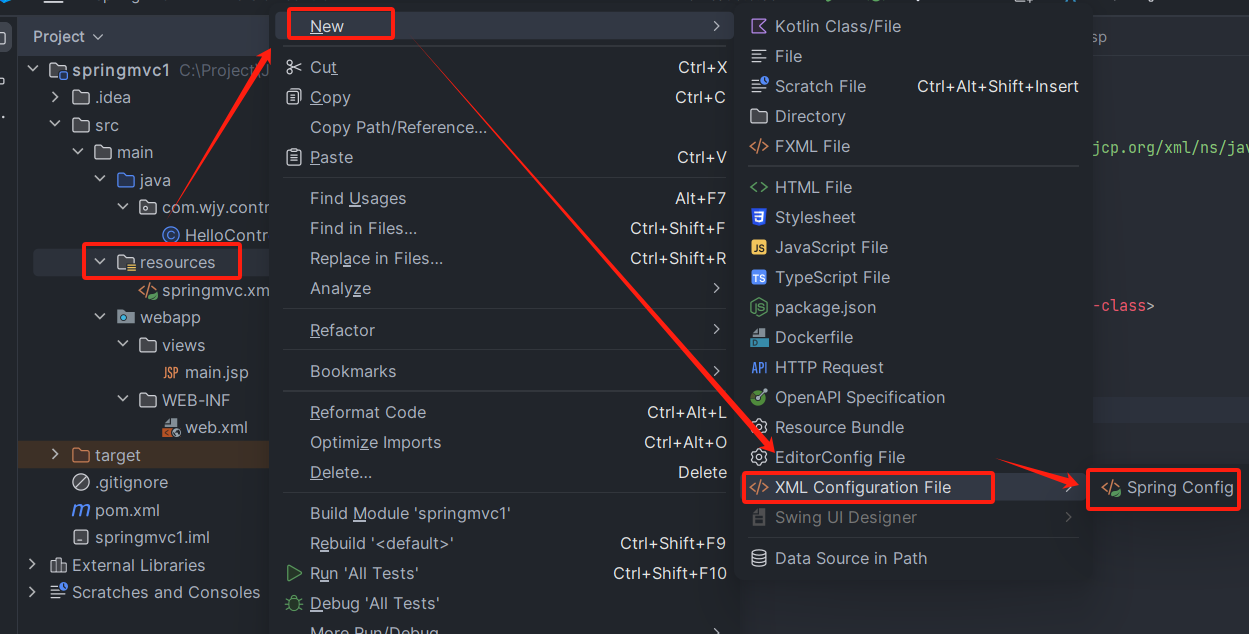
<?xml version="1.0" encoding="UTF-8"?>
<beans xmlns="http://www.springframework.org/schema/beans"
xmlns:xsi="http://www.w3.org/2001/XMLSchema-instance"
xmlns:context="http://www.springframework.org/schema/context"
xmlns:mvc="http://www.springframework.org/schema/mvc"
xsi:schemaLocation="http://www.springframework.org/schema/beans http://www.springframework.org/schema/beans/spring-beans.xsd http://www.springframework.org/schema/context https://www.springframework.org/schema/context/spring-context.xsd http://www.springframework.org/schema/mvc https://www.springframework.org/schema/mvc/spring-mvc.xsd">
</beans>
<?xml version="1.0" encoding="UTF-8"?>
<beans xmlns="http://www.springframework.org/schema/beans"
xmlns:xsi="http://www.w3.org/2001/XMLSchema-instance"
xmlns:context="http://www.springframework.org/schema/context"
xmlns:mvc="http://www.springframework.org/schema/mvc"
xsi:schemaLocation="Index of /schema/beanshttp://www.springframework.org/schema/beans/spring-beans.xsdIndex of /schema/contexthttps://www.springframework.org/schema/context/spring-context.xsdIndex of /schema/mvchttps://www.springframework.org/schema/mvc/spring-mvc.xsd">
<!--包扫描-->
<context:component-scan base-package="com.wjy.controller"/>
<!--开启注解驱动-->
<mvc:annotation-driven/>
<!--视图解析-->
<bean class="org.springframework.web.servlet.view.InternalResourceViewResolver">
<property name="prefix" value="/views/"/>
<property name="suffix" value=".jsp"/>
</bean>
</beans>
4.注册servlet
<?xml version="1.0" encoding="UTF-8"?>
<web-app xmlns="http://xmlns.jcp.org/xml/ns/javaee"
xmlns:xsi="http://www.w3.org/2001/XMLSchema-instance"
xsi:schemaLocation="Java EE: XML Schemas for Java EE Deployment Descriptorshttp://xmlns.jcp.org/xml/ns/javaee/web-app_4_0.xsd"
version="4.0">
</web-app>
<?xml version="1.0" encoding="UTF-8"?> <web-app xmlns="http://xmlns.jcp.org/xml/ns/javaee" xmlns:xsi="http://www.w3.org/2001/XMLSchema-instance" xsi:schemaLocation="http://xmlns.jcp.org/xml/ns/javaee http://xmlns.jcp.org/xml/ns/javaee/web-app_4_0.xsd" version="4.0"> <!--注册DispatcherServlet--> <servlet> <servlet-name>springmvc01</servlet-name> <servlet-class>org.springframework.web.servlet.DispatcherServlet</servlet-class> <init-param> <param-name>contextConfigLocation</param-name> <!--classpath编译后的路径--> <param-value>classpath:springmvc.xml</param-value> </init-param> </servlet> <!--servlet映射 /表示任意路径 --> <servlet-mapping> <servlet-name>springmvc01</servlet-name> <url-pattern>/</url-pattern> </servlet-mapping> </web-app>5.创建控制层处理类
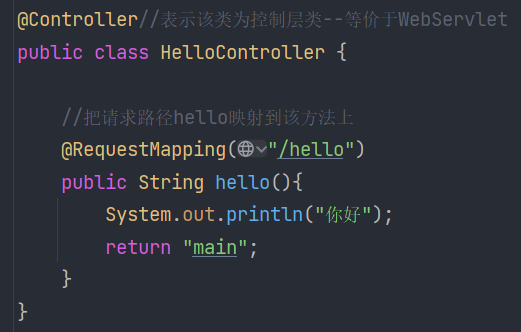
6.部署tomcat并访问
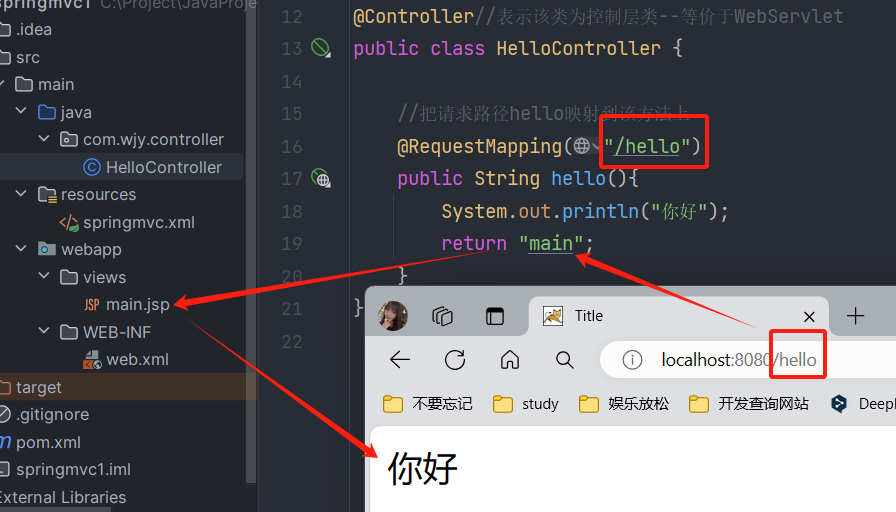
二、
1.流程
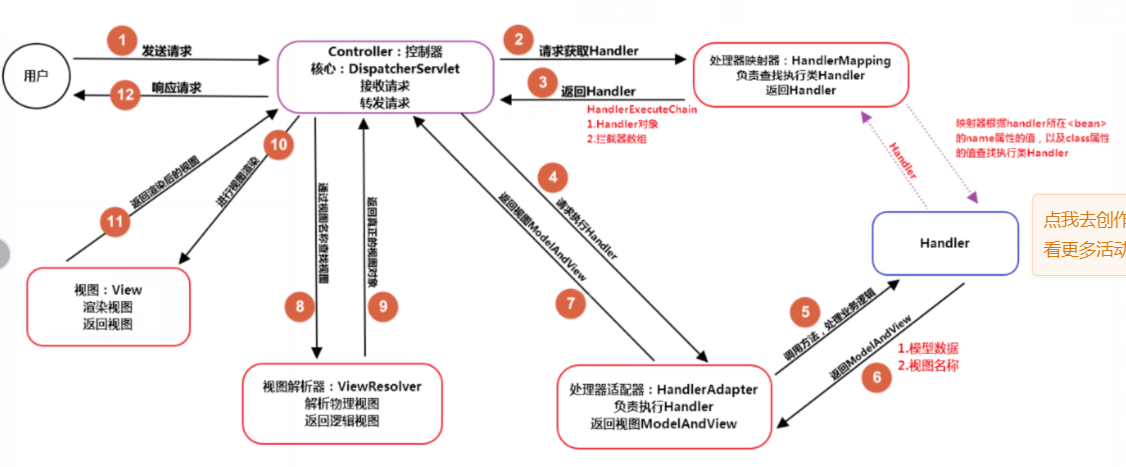
1.客户端发送请求:http://localhost:8080/hello
2.来到tomcat服务器
3.springmvc的前端控制器DipatcherServlet接受所有的请求
4.查看你的请求地址和哪个@RequesMaping匹配。
5.执行对应的方法。方法返回一个字符串。
6.springmvc把该字符串解析【视图解析器】为要转发的网页。把该字符串经过视图解析器拼接。/prefix/字符串.后缀
7.拿到拼接的地址,找到对应的网页。
8.渲染该网页给客户。
2.springmvc接收参数
2.1接收少量参数
比如删除时,传递一个参数

2.2接收大量参数
表单提交的数据--大量数据,我们可以封装到一个类中。
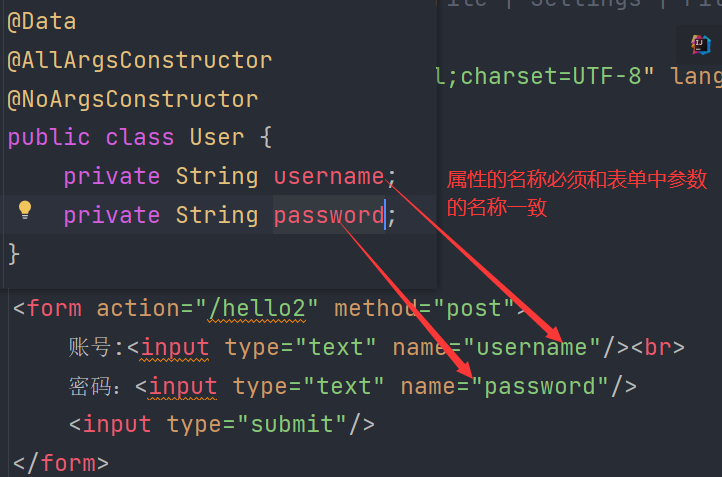
控制层代码
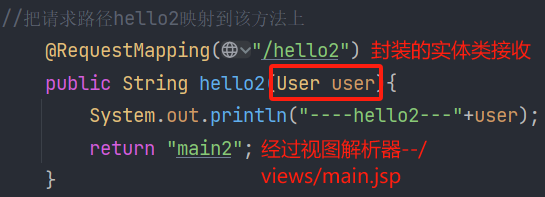
3.解决中文乱码问题
只能使用过滤器
3.1第一种方式
自己定义时使用的servlet依赖
<dependency>
<groupId>javax.servlet</groupId>
<artifactId>javax.servlet-api</artifactId>
<version>3.1.0</version>
</dependency>
package com.wjy.filter; import javax.servlet.*; import javax.servlet.annotation.WebFilter; import java.io.IOException; @WebFilter("/*") public class EncodingFilter implements Filter { public void init(FilterConfig filterConfig) throws ServletException { } public void doFilter(ServletRequest request, ServletResponse response, FilterChain chain) throws IOException, ServletException { response.setCharacterEncoding("utf-8"); request.setCharacterEncoding("utf-8"); chain.doFilter(request,response); } public void destroy() { } } 3.2第二种--web.xml
使用spring提供的编码过滤器
<!--注册编码过滤器-->
<filter>
<filter-name>encodingFilter</filter-name>
<filter-class>org.springframework.web.filter.CharacterEncodingFilter</filter-class>
<init-param>
<param-name>encoding</param-name>
<param-value>utf-8</param-value>
</init-param>
<init-param>
<param-name>forceRequestEncoding</param-name>
<param-value>true</param-value>
</init-param>
<init-param>
<param-name>forceResponseEncoding</param-name>
<param-value>true</param-value>
</init-param>
</filter>
<filter-mapping>
<filter-name>encodingFilter</filter-name>
<url-pattern>/*</url-pattern>
</filter-mapping>
4.处理日期类
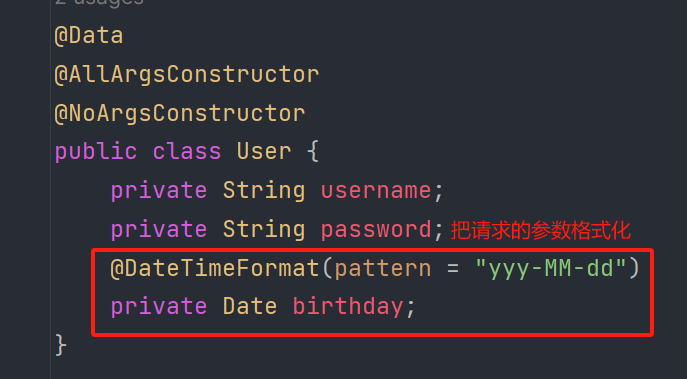
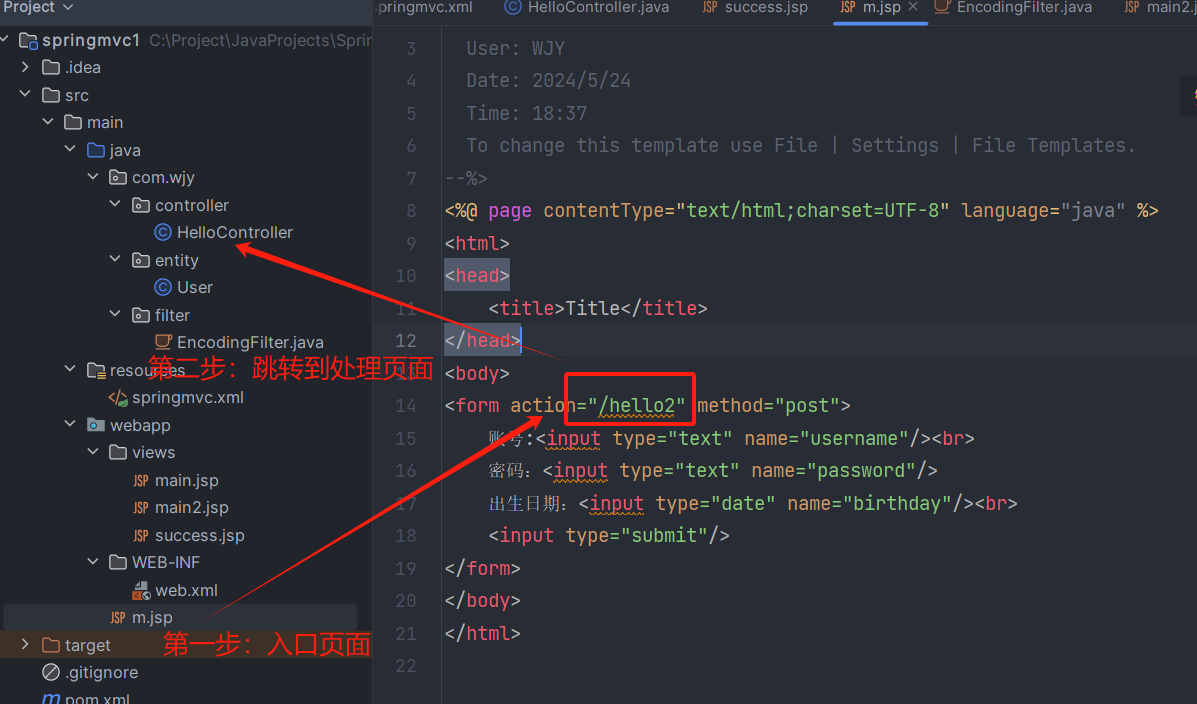
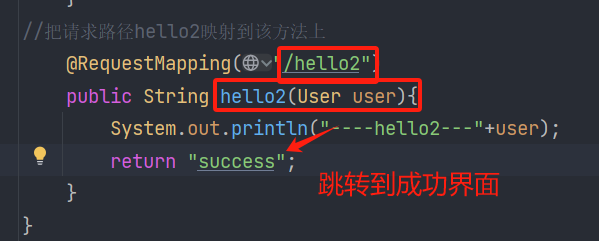
5.处理静态资源--springmvc.xml
<!--放行静态资源:只处理servlet请求,其他的请求不会经过springmvc-->
<mvc:default-servlet-handler/>
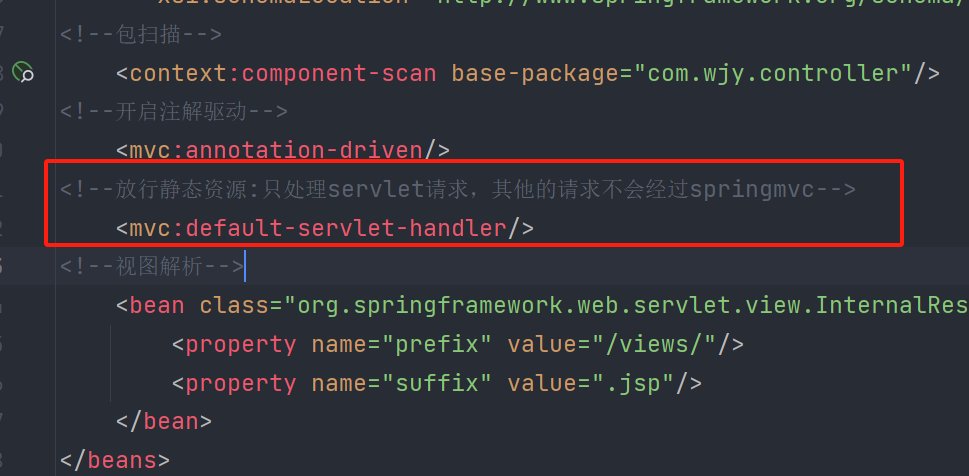
6.小测试
@Data @AllArgsConstructor @NoArgsConstructor public class User { private String username; private String password; // 日期格式转换 @DateTimeFormat(pattern = "yyyy-MM-dd") //日期显示时间戳 @JsonFormat(pattern = "yyyy-MM-dd HH:mm:ss",timezone = "GMT+8")//json的格式 private Date birthday; }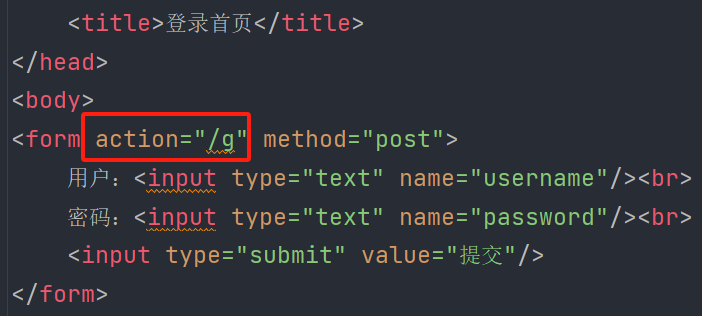
搭建好上面的框架后(一、步骤的内容)写控制处理类的内容--关于登录
@Controller public class LoginController { @RequestMapping("/g")//跳转的位置 public String login(User user){ if ("admin".equals(user.getUsername())&&"123".equals(user.getPassword())){ return "success";//符合要求--经过视图解析器(转发):/views/success.jsp } return "redirect:/login.jsp";//重定向跳转--且不经过视图解析器 } }三、
1. 控制层如何保存数据到页面
Servlet保存数据可以使用四大域对象:PageContext、Request、Session、Appliaction
request.setAttribute(key,value);//存放数据到request中
request.getAttribute(key);或者${key}//获取request对象中保存的数据
第一种:先加入session依赖才能使用
<!--servlet依赖-->
<dependency>
<groupId>javax.servlet</groupId>
<artifactId>servlet-api</artifactId>
<version>2.5</version>
</dependency>
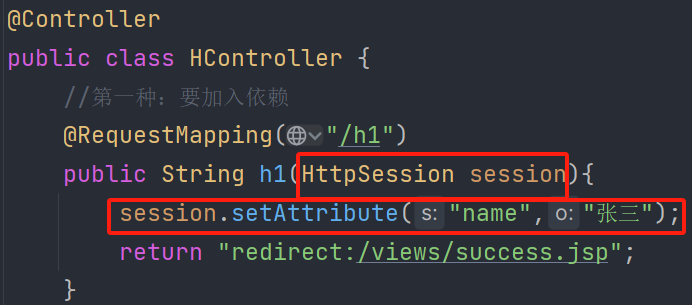
第二种:springmvc封装好的,直接加入注解使用
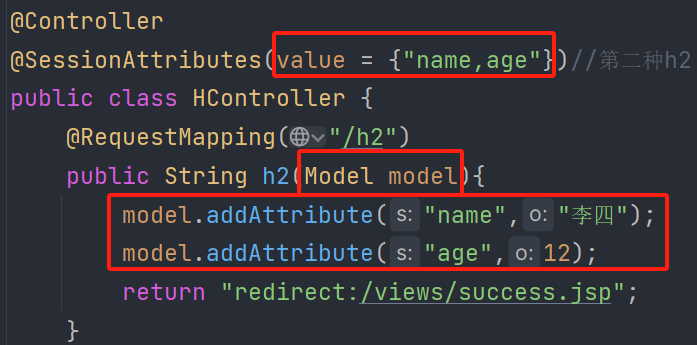
总结:
spring保存数据可以像之前servlet保存数据一样。也可以使用model类对象保存
model类中保存数据默认作用域request,设置作用域为session。@SessionAttributes(value={"key"})
2. springmvc返回json数据
1.ajax异步请求时需要响应json数据
实现ajax的方式:①jquery②axios
2.servlet之前响应json数据的步骤:
①引入fastjson依赖
②JSON.toJsonString(java对象)//把java对象转化为json字符串
③out.print(json数据)
④out.flush();out.close();
3.springmvc响应json数据
1.引入jackson依赖
2.在controller方法上使用@ResponseBody:java对象转化为json字符串
3.该方法返回类型java对象
①引入依赖jackson
<dependency>
<groupId>com.fasterxml.jackson.core</groupId>
<artifactId>jackson-databind</artifactId>
<version>2.15.2</version>
</dependency>
@RequestMapping("/ajax01") @ResponseBody//把该方法返回的java对象转化为json字符串--jackson public User ajax01(){ User user = new User("wjy","123456",new Date()); return user; } @RequestMapping("/ajax02") @ResponseBody public List<User> ajax02(){ ArrayList<User> users = new ArrayList<User>(); users.add(new User("王佳瑶","1203",new Date())); users.add(new User("高元浩","0906",new Date())); return users; }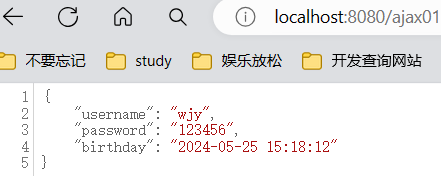
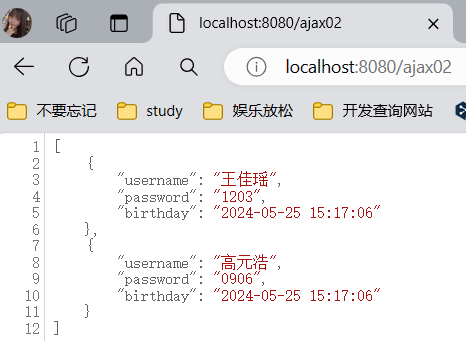
2.1日期显示时间戳
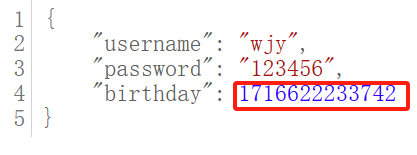
// 日期格式转换
@DateTimeFormat(pattern = "yyyy-MM-dd")
//日期显示时间戳,timezone表示时区,GMT+8表示东八区(中国)
@JsonFormat(pattern = "yyyy-MM-dd HH:mm:ss",timezone = "GMT+8")//json的格式
private Date birthday;
3. springmvc全局异常处理
当controller出现异常时,全部交于springmvc的全局异常处理类解决
@ControllerAdvice//控制层的异常处理 public class MyGlobeExceptionHandler { //当控制层发生RuntimeException异常类型时交于该方法处理 @ExceptionHandler(value = RuntimeException.class) public String my01(RuntimeException e){//把异常处理的对象交于该方法的参数 System.out.println("发生了运行时异常"); return "fail"; } //当控制层发生Exception异常类型时交于该方法处理 @ExceptionHandler(value = Exception.class) public String my02(Exception e){//把异常处理的对象交于该方法的参数 System.out.println("发生了Exception时异常"); return "fail"; } } @RequestMapping("/list01") public String list01(HttpSession session,int id) throws Exception { //如果上面的异常处理类只有一个Exception异常不管这里有什么异常它都会执行 //Exception所有异常的父类 if(id==1){//等于1时会输出第一个异常 int c=10/0; }else if(id==2){//输出第二个异常 throw new Exception("~~~~~~~~"); } //保存数据到session session.setAttribute("name","王五"); return "redirect:/views/main.jsp"; }3.扫描异常处理类
<!--com.wjy:扫描该包以及该包下的子包(范围广)-->
<context:component-scan base-package="com.wjy"/>
<!--扫描多个包之间使用逗号隔开-->
<context:component-scan base-package="com.wjy.Controller,com.wjy.handle"/>
4. springmvc拦截器
之前使用filter过滤,拦截不符合要求的一切请求资源
拦截器:拦截器只会拦截controller层的资源

4.1创建一个拦截器
public class MyInterceptor implements HandlerInterceptor { //前缀拦截器--Boolean。如果返回true允许放行 public boolean preHandle(HttpServletRequest request, HttpServletResponse response,Object handler) throws Exception{ System.out.println("拦截器"); return false; } }4.2配置拦截规则
<!--配置拦截器规则-->
<mvc:interceptors>
<mvc:interceptor>
<!--mapping:拦截的规则/**:表示多层路径-->
<mvc:mapping path="/**"/>
<!--exclude-mapping:不会被拦截的路径-->
<mvc:exclude-mapping path="/g"/>
<!--bean:表示自定义的拦截器的路径-->
<bean class="com.wjy.interceptor.MyInterceptor"/>
</mvc:interceptor>
</mvc:interceptors>
5.restful风格
@ResController:控制层类(表示该类中所有的方法返回的都是json数据)
@GetMapping():只处理get请求方式(一般处理查询请求)
@PostMapping():添加 (使用Post发送请求)
@DeleteMapping():删除
@PutMapping():修改
@RequestBody:把json字符串转化为java对象,使用在方法的参数上
四、文件上传
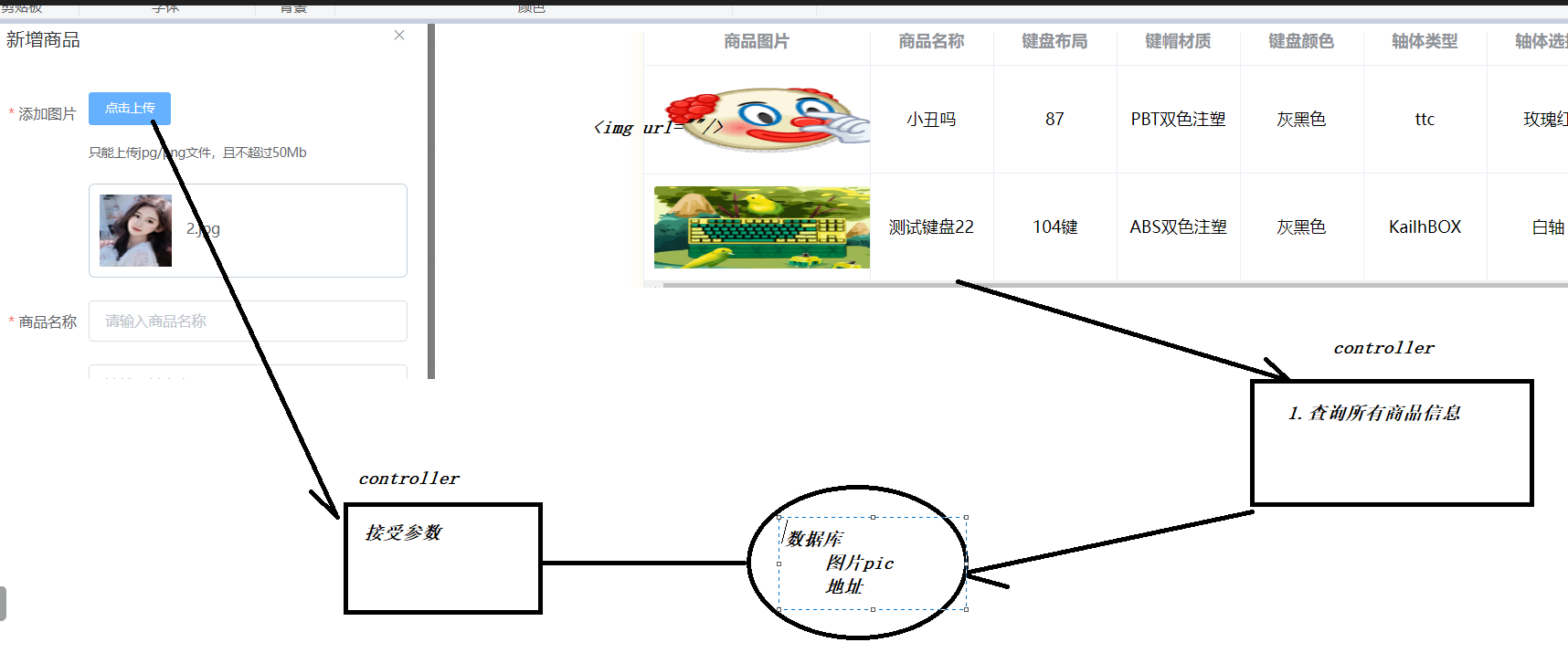
1.引入上传的依赖
<!--文件上传依赖-->
<dependency>
<groupId>commons-fileupload</groupId>
<artifactId>commons-fileupload</artifactId>
<version>1.4</version>
</dependency>
2.配置文件上传的拦截器
<!--文件上传解析器 id:必须为multipartResolver-->
<bean id="multipartResolver" class="org.springframework.web.multipart.commons.CommonsMultipartResolver">
<!--设置文件上传的大小 单位为byte字节 1M=1024kb=1024b 10*1024*1024-->
<property name="maxUploadSize" value="10485760"/>
<!--设置编码-->
<property name="defaultEncoding" value="utf-8"/>
</bean>
3.完成上传文件的代码
<%--表单: 提交方式必须为post enctype编码:multipart/form-data文件编码--%>
<form method="post" action="/upload" enctype="multipart/form-data">
<%--input必须设置文件文件框 而且必须起名称--%>
选择上传的文件:<input type="file" name="myfile"/><br>
<input type="submit" value="上传"/>
</form>
1.本地上传
@Controller
public class UploadController {
/**
*
* @param myfile 接受你上传的文件对象信息封装到该类。该类中可以获取上传文件的信息。比如:文件名 文件大小 文件后缀等
* 这个名称必须为文件上传表单的文件框的名称一致
* @return
*/
@PostMapping("/upload")
public String upload(MultipartFile myfile, HttpServletRequest request) throws IOException {
//获取tomcat上下文中的指定目录的路径
String realPath = request.getSession().getServletContext().getRealPath("/upload");
//根据上面的路径创建一个文件对象
File file=new File(realPath);
//如果没有该目录则创建
if (!file.exists()) {
file.mkdirs();
}
//把上传的文件转移到upload目录下--重名覆盖了
String uuid = UUID.randomUUID().toString().replace("-", "");
File target=new File(realPath+"/"+(uuid+myfile.getOriginalFilename()));
myfile.transferTo(target);
return "success";
}
}
2.Oss服务器上传
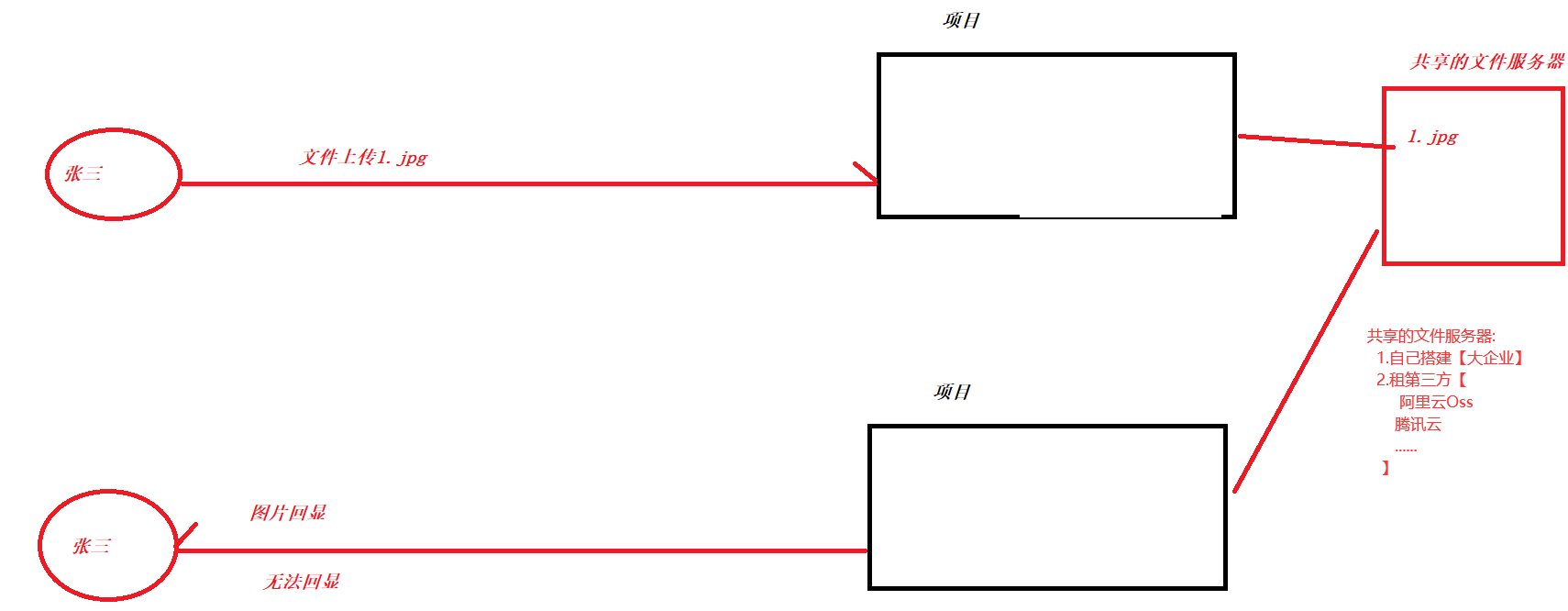
- 如果项目搭建了集群。那么导致文件数据无法共享。
- 如果项目的target删除了。导致文件数据丢失。
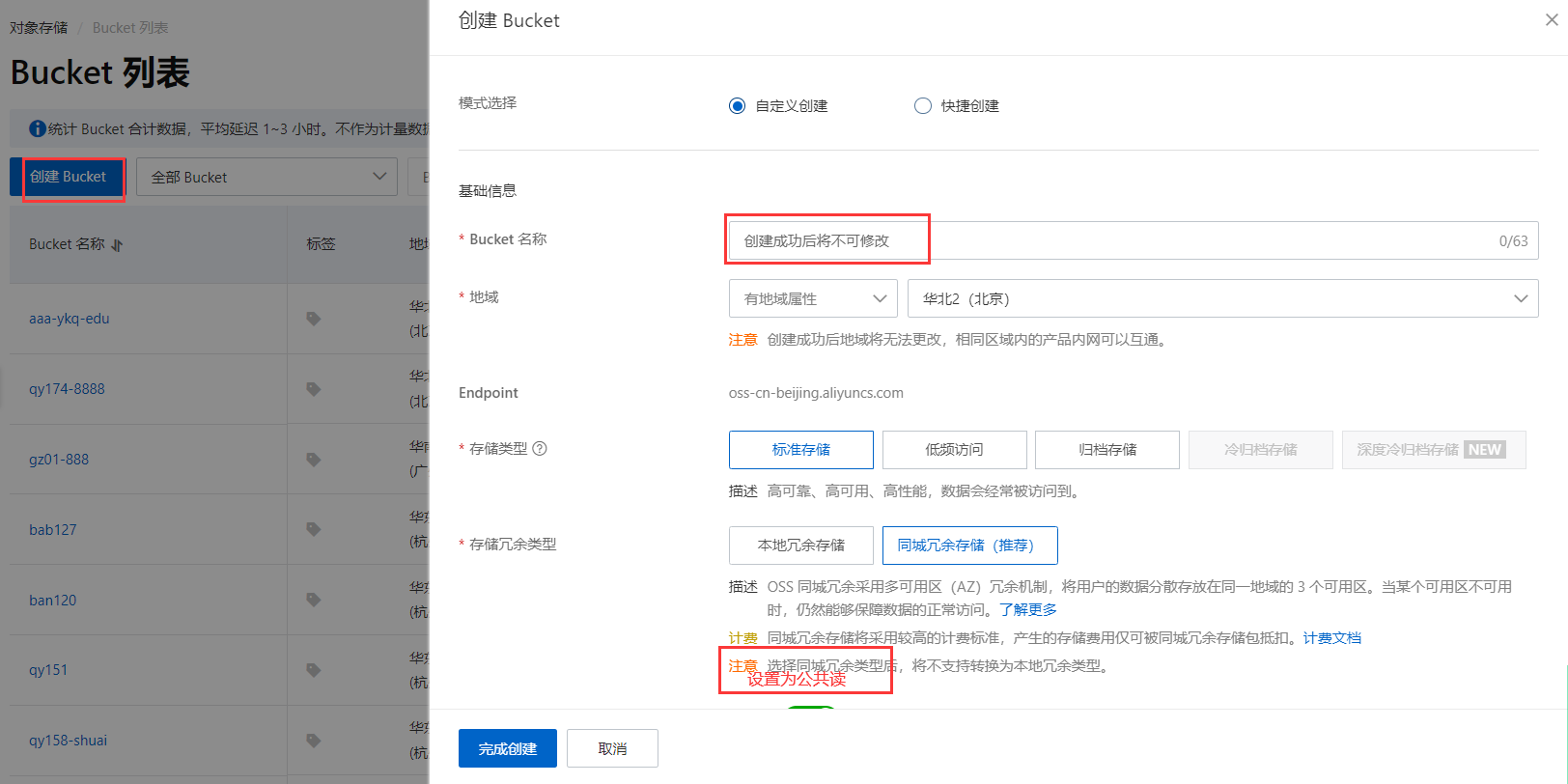
引入oss的依赖[jdk8]
<dependency>
<groupId>com.aliyun.oss</groupId>
<artifactId>aliyun-sdk-oss</artifactId>
<version>3.15.1</version>
</dependency>
代码

@PostMapping("/upload2") public String upload(MultipartFile file){ // Endpoint以华东1(杭州)为例,其它Region请按实际情况填写。 String endpoint = "oss-cn-beijing.aliyuncs.com"; // 填写Bucket名称,例如examplebucket。 String bucketName = "qy174-wjy-01"; //上传到oss后的名字 String objectName = UUID.randomUUID().toString().replace("-","")+file.getOriginalFilename(); // 创建OSSClient实例。 /** * String endpoint,自己的endpoint * String accessKeyId, 自己的id * String secretAccessKey自己的密钥 */ String accessKeyId="LTAI5tGhFRyaoCHa7jm7Mjzx"; String secretAccessKey="dkOIOg15IDUJZ2LJCOU4Tz7arnGfOC"; OSS ossClient = new OSSClientBuilder().build(endpoint,accessKeyId,secretAccessKey); try { InputStream inputStream = file.getInputStream(); // 创建PutObjectRequest对象。 PutObjectRequest putObjectRequest = new PutObjectRequest(bucketName, objectName, inputStream); // 创建PutObject请求。 PutObjectResult result = ossClient.putObject(putObjectRequest); //上传的地址 String path="https://"+bucketName+"."+endpoint+"/"+objectName; return path; } catch (Exception oe) { } finally { if (ossClient != null) { ossClient.shutdown(); } } return "失败"; }<%-- 添加对话的开始--%> <el-dialog title="添加" :visible.sync="addDialogForm"> <el-form ref="addForm" :rules="rules" :model="addForm" label-width="80px"> <el-form-item label="广告标题" prop="title"> <el-input v-model="addForm.title"></el-input> </el-form-item> <el-form-item label="广告照片" prop="imageUrl"> <%-- action:文件上传的路径 show-file-list:列表的数列值 on-success:上传成功触发的函数 before-upload:上传前触发的函数--%> <el-upload class="avatar-uploader" action="/upload" :show-file-list="false" :on-success="handleAvatarSuccess" :before-upload="beforeAvatarUpload" <%-- v-model="addForm.imageUrl"--%> > <img v-if="imageUrl" :src="imageUrl" class="avatar"> <i v-else class="el-icon-plus avatar-uploader-icon"></i> </el-upload> </el-form-item> <el-form-item> <el-button type="primary" @click="addSubmit('addForm')">提交</el-button> <el-button @click="addDialogForm=false">取消</el-button> </el-form-item> </el-form> </el-dialog> <%-- 添加对话的结束--%>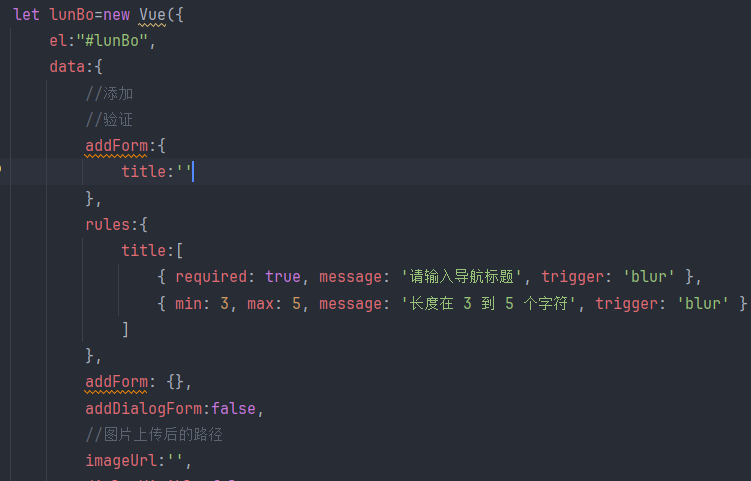
//上传后的地址 handleAvatarSuccess(res, file) { this.imageUrl = res; /* let reader = new FileReader() reader.readAsDataURL(file.raw) reader.onload = () => { this.imageUrl = reader.result }*/ }, //上传前触发的函数 beforeAvatarUpload(file) { const isJPG = file.type === 'image/jpeg'; const isLt2M = file.size / 1024 / 1024 < 2; if (!isJPG) { this.$message.error('上传头像图片只能是 JPG 格式!'); } if (!isLt2M) { this.$message.error('上传头像图片大小不能超过 2MB!'); } return isJPG && isLt2M; }, //点击添加--打开对话框 showAdd(){ this.addDialogForm=true; }, //确认添加 addSubmit(formName){ this.$refs[formName].validate((valid)=> { if (valid) { this.addForm.imageUrl = this.imageUrl; this.addDialogForm = false; axios.post("insertLunBo", this.addForm).then(result => { if (result.data.code === 200) { this.$message.success(result.data.msg); this.addForm = {}; this.loadMessage(); } else { this.$message.error(result.data.msg); } }) } }) },